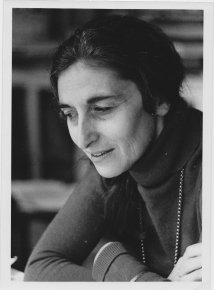Such a lovely May Day! Almost too lovely – and too hot! I sweated in front of the fan as I mused on May-Day traditions. In the twentieth century, we used to rise at dawn to make paper cones, fill them with violets and flowering weeds, add tiny scrolls on which we had copied poems, and drop the “May baskets” on friends’ porches. A charming custom, which has faded into oblivion.
It was hot when I got up – much too hot to believe it was May: eighty-seven degrees. And so I devoted myself to sitting still and reading a remarkable book, At the End of the Century: The Stories of Ruth Prawer Jhabvala.

Readers of this blog will already know my fondness for Ruth Prawer Jhabvala, who won the Booker Prize in 1975 for Heat and Dust. A writer of Polish and German descent, she married an Indian architect, Cyrus Jhabvala, and lived in India for many years; later she lived in New York and wrote screenplays for Merchant Ivory films. I am especially captivated by her exceptional short stories, some set in India, others in England and the U.S. They have the best features of her novels: a simple but percipient voice and style; a compassion for displaced characters; and perfectly-etched descriptions of scenery.
Jhabvala’s characters become our friends and relatives as we read. We understand the comic determination of Nalini, the homesick Indian girl in “A Course of English Studies,” who seduces her married professor at a Midlands college in England; and the exhilaration of Sofia, the depressed wife in “Desecration,” who falls in love with the corrupt Superintendent of Police.

Many of Jhabvala’s stories reflect aspects of Western masterpieces, as seen through a mirror of Indian culture. The first sentence of “Desecration” conjures the tragedy of Anna Karenina or Madame Bovary: “It is more than ten years since Sofia committed suicide in the hotel room in Mohabbatur.” Sofia is a vibrant, pretty woman who comes from nowhere. No one knows her background or who she is – she looks to be part Afghan “with a dash of Russian”- and her only talent is for entertaining important guests at dinner parties. Her husband, Raja Sahib, is thirty years older, so we understand why she falls for the dynamic, much younger SP (Superintendent of Police). And then she blinds herself to the degradation of their meetings in a sleazy hotel. In this short pitch-perfect narrative, we feel both sympathetic and annoyed by Sofia on her downward path.

Sofia is not the only woman in Jhabvala’s stories to fall in love with a cad. In “A Spiritual Call,” Daphne meets an Indian swami in London. After traveling to his ashram in India, she becomes disillusioned with his hypocrisy and fakery, yet she cannot break away. And even I cannot help but be charmed by Swamiji when he says, “Can I talk to you? You won’t turn into a laurel tree?” (You know me, the Ovidian.)
Sometimes even female characters become spellbound by female dissemblers. In “Great Expectations,” the solitary, self-satisfied Pauline, a canny real estate agent, has shown many properties to Sylvie, a blond, wan, indecisive client, and her daughter Amy, but Sylvie never signs a lease. The two are kicked out of a friends’ apartment, so Pauline allows them grudgingly to stay at her house for a few days… which turn into many days. We cannot help but think of Daphne and Swamiji when Pauline becomes mesmerized by Sylvie and Amy and their dream of going to India.
The stories in At the End of the Century were chosen by Jhabvala’s family, and span the time from 1963 to 2013 (the year she died). I had read many of these stories before, but I found them mesmerizing a second time.
And that is the test of a great book, don’t you think? Good books are fine for one reading, but great books delight again and again.

I’ll be teaching Jhabvala’s A Backward Place soon. On my WomenWriters list we once read one of her volumes of short stories:
http://www.jimandellen.org/gothic/EastIntoUpper.html
Ellen
She’s worthwhile teaching.
Great post. Been meaning to read Heat and Dust for years. I will get a copy now.
It is a smart, quiet novel, one of my favorites. Enjoy!